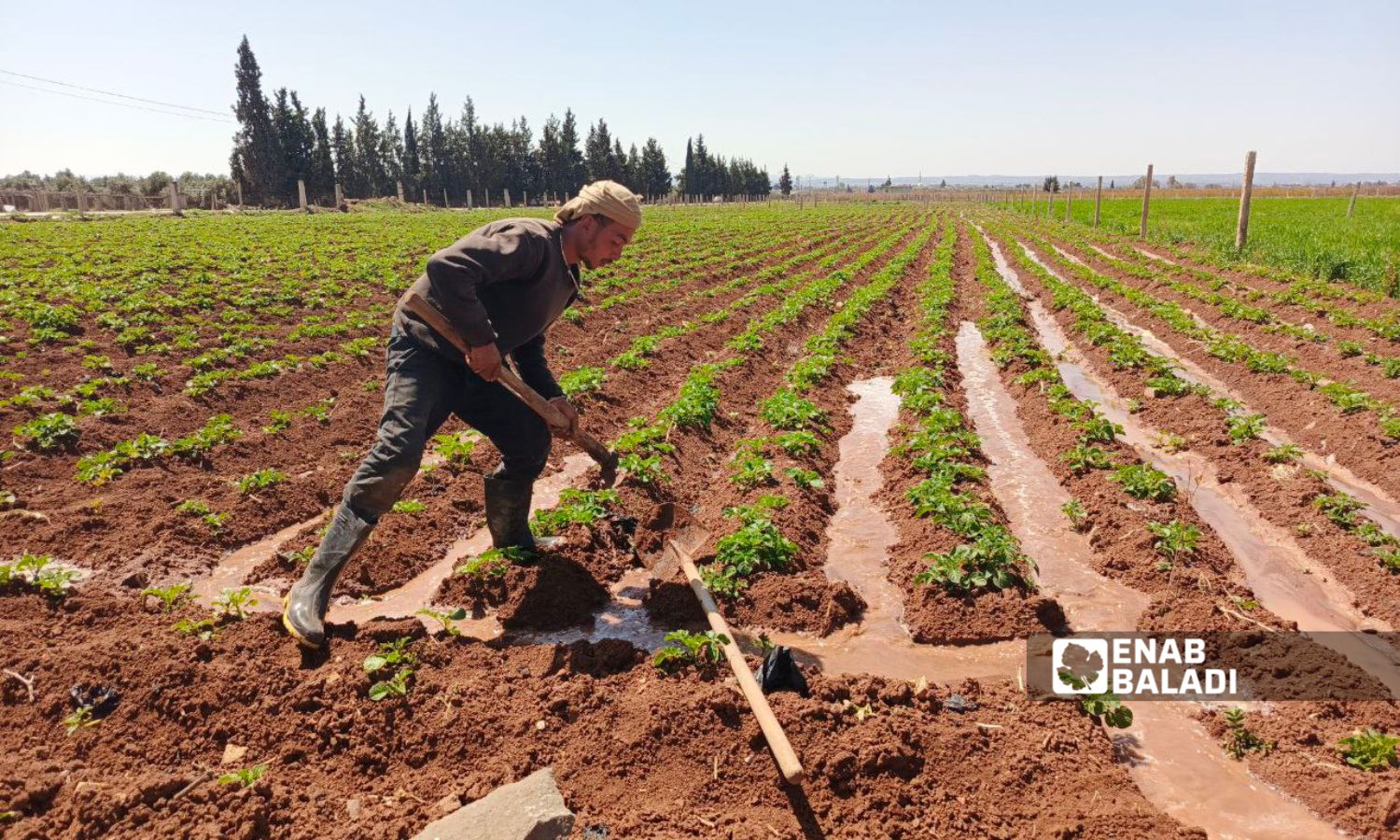Daraa – Mahjoub al-Hashish
The prices of agricultural drugs and fertilizers in Daraa province, southern Syria, have decreased following the fall of Bashar al-Assad’s regime.
Several agricultural engineers in Daraa attributed the decrease to various factors, most notably the removal of military checkpoints affiliated with the previous regime that imposed fees on agricultural drugs and fertilizers entering Syria. This was accompanied by a drop in transportation costs after fuel prices decreased.
Fertilizers and agricultural drugs constitute the largest part of production costs, and their price drop contributes to achieving a profit margin for farmers.
A decrease of half
According to observations by Enab Baladi, the price of a ton of urea fertilizer dropped from $850 at the end of 2024 to $500 (5.5 million Syrian pounds), while the price of soluble fertilizers decreased from $3.5 to $2.5 per kilogram, and the prices of some agricultural drugs have nearly halved.
Agricultural engineer Riyad al-Rabdawi, who owns an agricultural pharmacy in the city of Tafas, told Enab Baladi that the prices of agricultural drugs and fertilizers have decreased by almost half compared to their prices before the fall of Assad’s regime on December 8, 2024.
He added that the 4th Division checkpoints used to charge fees of about $6 for each liter entering from northern Syria, sourced from Turkey or the European Union, as well as the same cost for drugs entering from Jordan. Additionally, customs restrictions on importers forced them to raise prices.
After the fall of the Assad regime, these fees ended, contributing to the drop in drug prices, and this price reduction was accompanied by a decline in transportation costs after the price of diesel fell from 20,000 Syrian pounds (around $2) to 10,000 Syrian pounds (around $1).
Seed prices remain unchanged
Seed prices have remained stable, with some even increasing compared to the previous season.
Engineer Ahmad al-Hourani, who has an agricultural pharmacy in the city of Tafas, attributed the rise in seed prices to traders’ reluctance to import them this season. Under the ousted Assad regime, the government had supported seed imports only at a preferential price to offload dollars at a rate of 8,000 Syrian pounds per dollar.
He added that seeds are currently unavailable, which has increased demand and subsequently raised prices, noting that one dunum costs over $60 for tomato seeds, for example.
Turkish seed varieties are available, but they are new to Daraa province, so farmers are still experimenting with them in small areas to ensure their quality and productivity. Consequently, they are currently seeking out tried-and-true seed varieties, even if at a higher price, until farmers can verify the viability of Turkish seeds, especially for tomatoes, cucumbers, zucchini, or watermelon, among others, in the upcoming season.
Farmers hopeful
Some farmers expressed optimism after the drop in agricultural drug and fertilizer prices, hoping to achieve a profit margin in future seasons.
Mohammad al-Hashish, a farmer with 11 dunums of pomegranate, told Enab Baladi that the largest costs were incurred during the past season due to agricultural drug and fertilizer prices, as he paid his agricultural pharmacy $3,000 after selling his harvest.
Al-Hashish expects these costs to decrease by half during the upcoming season following the drop in fertilizer and drug prices.
He added that during the past period, he often disregarded the agricultural engineer’s advice and spaced out his crop spraying to avoid costs, as the spraying costs reached approximately 1.5 million Syrian pounds (around $150).
Farmer Hassan Kiwan from western rural Daraa stated that the largest costs still lie in diesel prices, and he called for restoring support for farmers with fuel or providing electricity to pumping projects and private wells to reduce production costs.
He added that costs have decreased with the falling prices of fertilizers and drugs, but farmers are still concerned about crop surplus. Therefore, the new government should open up export opportunities to neighboring countries, especially the Gulf Arab states.
Farmers are also worried about the diminishing irrigation water, especially since this year has seen little rainfall, leading to reduced irrigation water levels in reservoirs and more consumption of groundwater during the winter. In previous years, farmers did not use irrigation water during this season.
Engineer al-Rabdawi indicated that the upcoming danger in Daraa is the dwindling irrigation water, expressing concern about the continued drying up of wells and springs.
In recent years, drought has affected important water sources in Daraa, leading to the exhaustion of thousands of random wells, which has deepened the effects of the recent drought wave and resulted in decreased agricultural output, the most significant source of livelihood in Daraa, often referred to as the “vegetable basket” of Syria. The government’s failure to find alternatives has exacerbated the situation.
The Muzayrib lake is one of the clearest indicators of drought in Daraa, which has turned into a barren land planted with pepper and tomato seedlings and barley crops.
Among the crops most affected by drought in Daraa was olive, even though its trees are more drought-resistant than others and can be irrigated twice in the summer, provided the land is continually plowed to maintain soil moisture, according to an investigation by Enab Baladi/Syria Indicator.
Agricultural drug prices drop in Daraa: Farmers optimistic Enab Baladi.
Read More Details
Finally We wish PressBee provided you with enough information of ( Agricultural drug prices drop in Daraa: Farmers optimistic )
Also on site :
- Lou Christie, “Lightnin’ Strikes” and “Rhapsody in the Rain” Singer, Dies at 82
- Legendary '80s Metal Band Performs Fan-Favorite for First Time in 20 Years: 'Sounding Great'
- Hundreds of Iranian Civilians Die in Israeli Strikes, Including a Poet and an Equestrian

